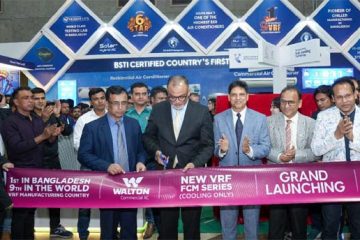Govt-Sponsored Rmg Factory Inspection
Process stalled as 1st-phase reports not finalised yet
The government-sponsored and the International Labour Organisation-supported safety inspection to the readymade garment factories remained stalled for the last two months as the first-phase inspection reports of 200 garment factories are yet to be finalised.
It will take over a month more to start the safety assessment for the second phase, people involved with the process told New Age.
An ILO high official said that the second phase inspection might start by May while the government officials said the inspection will resume within 15-20 days.
To ensure fire and building safety in the RMG sector, the government in association with the ILO on November 22 started formal inspection of the factories which are not on the inspection lists published by EU Accord and North American Alliance.
Earlier on November 15, the government had started inspection of the RMG factories on a pilot basis after missing several deadlines because of an absence of common standards for the safety assessment in the garment factories.
According to the labour ministry officials, under the National Tripartite Committee the government and ILO estimated about 1,500 factories across the country to assess their fire and electrical safety and structural integrity.
The government and the ILO had also targeted to complete the inspection of 200 readymade garment factories by December last year.
Several inspection teams led by the Bangladesh University of Engineering and Technology assessed a total of 248 factories by the deadline and submitted their inspection reports to the labour ministry in mid-January.
The BUET experts said the reports are now under review as the ILO asked them to modify the reports as per international standard.
‘The ILO has appointed an institution to supervise the inspection reports and the institution suggested to modify the reports in line with the EU Accord,’ Ishtiaque Ahmed, an expert from BUET told New Age on Friday.
He said that the modification process will take time as some technical issues are yet to be resolved between Accord and BUET experts.
‘Now we are modifying our previous reports to the colour mark grading system in line with the format of Alliance and Accord and based on the risk the factories will be green, yellow, amber and red marked, ’ Ishtiaque said.
‘But we have difference in some technical issues like concrete strength,’ he said.
To modify the inspection reports with the colour grading system, all parties will have to come in a consensus on the issue of concrete strength, another BUET expert said.
He said that during the safety assessment, the BUET considered the concrete strength at 2,500 pound per square inch, but Accord and Alliance considered the concrete strength at 1,500 PSI for brick made structure and at 2,000 PSI for stone made.
‘We have a question about the test ability of concrete strength and if we agreed with the Accord and Alliance a large number of factories will go under red mark,’ the BUET expert said.
An ILO official said that a single approach alignment with the Accord and Alliance is required and they (ILO) are working for it.
Labour secretary Mikail Shipar said that the inspection will resume within 15-20 days after finishing the review of the first phase inspection report.
The BUET experts, however, said that the as per the agreement, the first phase inspection ended by December and now the second phase depends on the ILO as they have made a fresh agreement with the BUET.
After the Rana Plaza building collapse on April 24 that killed more than 1,100 people, mostly garment workers, the retailers and apparel brands from the EU and North America separately formed the Accord on Fire and Building Safety in Bangladesh and Alliance for Bangladesh Workers Safety Initiative.
Both the initiatives started their inspection in the RMG factories in Bangladesh.
Accord published a list of around 1,600 factories while Alliance a list of around 620 apparel units for inspection.
At the same time, the government has taken a three-and-a-half-year initiative under the ILO’s programme for ‘improving working conditions in the readymade garment sector’ to ensure fire, electrical and building safety and to ensure fundamental rights of workers in the apparel industry in Bangladesh.
-With New Age input




















